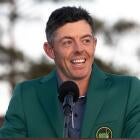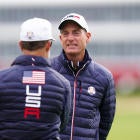
ROME -- In the middle of Max Homa's morning foursomes loss alongside Brian Harman to the European superteam of Viktor Hovland & Ludvig Aberg, a staffer ran out to the cart assigned to the American side. He was carrying a new sleeve of Titleist golf balls. When he jumped on the back of the cart that crept toward Homa's pairing, he was asked by the driver why he brought them over.
"Max is short on golf balls," the staffer said.
There is perhaps no better way to contextualize what happened to the United States on Friday as it played eight matches against Europe and won exactly none of them. The Euros lead 6.5 to 1.5 after Day 1 with their 5-point margin tying the most significant opening-day beatdown in the history of the Ryder Cup (Europe in 2004, U.S. in 1975).
Even though expectations were for this to be far more competitive, perhaps that was a foolish perspective. The U.S. lost all four morning foursomes matches, which fits in neatly with its history. The Americans are now 2-16-2 in their last 20 road foursomes matches. The Europeans shot 14 under total between the four matches combined in the alternate shot format, while the Americans shot a paltry 1 under.
Friday marked the first time in Ryder Cup history that the United States did not win a single match on Day 1.
It got better for the U.S. in afternoon four-ball ... for a while. With two red flags and a tie on the board late, Justin Thomas & Jordan Spieth, who sat in the morning session, were 1 UP on the 15th green, laboring to turn the tide and give the boys behind them something to run toward.
J.T. had a substantial putt for par to halve that hole, which he stood over for some time. At the last minute, he backed off the ball and got chided by the European crowd. It felt like a real moment in a week that will be full of them. You could almost see Thomas tense up under his red, white and blue uniform.
As soon as he dripped it in to preserve the 1 UP lead, Thomas turned and mean mugged the blue and golf with every fiber of his being. That preceded an explosion of expletives and a roar toward the fairway where Brooks Koepka & Scottie Scehffler were tied in their match with Jon Rahm & Nicolai Hojgaard.
JT is delivering. 📬@justinthomas34 | #RyderCup | #GoUSA pic.twitter.com/63EU0vHgbE
— Ryder Cup USA (@RyderCupUSA) September 29, 2023
Was that vindication for the sometimes-controversial J.T. captain's pick? Perhaps, but it was for moments like those that he was brought to Rome. With the Americans on tilt trying to find a 3 to 1 outcome in the afternoon, everyone was looking around for someone to lead them.
J.T. was that guy ... until Viktor Hovland destroyed him.
Fast-forward two holes later to the 18th. Thomas had a long eagle chip that would have given the U.S. its first full point. As it touched the edge of the hole, the gallery gasped. He was so close to what would have surely been a stake in the ground for the United States.
Instead, the moment was handed back to Hovland, who gladly delivered his fifth -- and most important -- birdie of the match to tie it, earning Europe a half point that looked lost. Just in front of where I sat and drank in the greatest event in sports, Shane Lowry, who sat out the afternoon matches, was so overcome that he rolled backwards into the rough and howled in disbelief.
Possibly the nicest badass in golf history.pic.twitter.com/nxArGdnxRH
— Kyle Porter (@KylePorterCBS) September 29, 2023
Just behind Hovland was Rahm, who chipped in for what felt like the 100th time on Friday -- it was actually the third of four times at the moment -- on the 16th hole for an eagle that moved his match alongside Hojgaard against Scheffler & Koepka back to all square. After Scheffler nearly dunked his tee shot on the 17th, the match swung back to the Americans. But of course, Rahm took the final putt. There's no reason to describe what ensued ...
JON RAHM 😲#TeamEurope | #RyderCup pic.twitter.com/zSbR5vMbSE
— Ryder Cup Europe (@RyderCupEurope) September 29, 2023
And of course there's Justin Rose & Bob MacIntyre, won their last two holes against Max Homa & Wyndham Clark to split that match and erase another sure American point.
In a flash, three potential Americans points were halved. Rather than trailing by two, the U.S. sits down five entering Day 2.
In all, 133 holes were played on Friday, and the Europeans were tied or leading the Americans after 115 of them. There is no overcoming that. It's extremely difficult to win points when those are the numbers you're fighting against.
What is to blame? Did U.S. captain Zach Johnson blow the matchups? Did he play the wrong guys? Does he have the wrong players on the team? Does the course favor the Europeans that significantly like it did five years ago in Paris?
There's probably a sliver of an answer to be found in each of those questions, but the reality is something I discussed with a peer Thursday during the last practice round.
"At some point," he said, "you have to lay all that stuff to the side and just out and play tremendous golf."
Should Thomas & Spieth have paired in foursomes? Perhaps. Should Scheffler & Sam Burns have been split up in the morning session? Probably. Should Collin Morikawa have gone two matches on Day 1? Perhaps not.
The cold truth for these Americans and their captain is that European superheroes played like superheroes Friday. They showed up. They played the type of golf it takes to win Ryder Cups.
For what feels like the 50th year in a row, at least on this side of the Atlantic, the best American players did not.
Why is this the case? There may not be a great answer, but you can bet that plenty of time will be spent over the next four years trying to find one. At this point, you would have to be an absolute fool to expect the Americans to play great in an European Ryder Cup. (This from someone who fell directly into this trap.)
It almost seems like a magic trick. There was talk on the grounds that MacIntyre had been swinging driver so poorly during the practice rounds that he might not even play until the Sunday singles matches. Of course, he hit his first drive 328 yards down the middle and made birdie. Hojgaard, who has played in four majors, went against two Americans who have won a combined six majors; yet it was Hojgaard who sunk a 47-foot birdie putt on the first hole.
Of course. This is what they do. If anyone knew how or why any of this happens to the United States when it visits Europe, one would earn a firm position in the team room.
European Ryder Cups simply appear to exist in an alternate reality, one that turns the best U.S. players to golfers with negative handicaps and one that immortalizes anyone not wearing stars and stripes.
The other cold, difficult truth?
This Ryder Cup is over.
No team has ever come back from more than a 4-point deficit after Day 1, and this team will not be the first to do it on the road in Rome against Hovland, Rahm and McIlroy.
It sounds plausible that the U.S. could win 62.5% of the remaining 20 points to tie and retain the Ryder Cup.
There will be moments where it feels as if the Americans have a chance. I'm here to tell you: They do not.
For one can perhaps enact a miracle on a particular stage at a particular venue or at a particular event. Not like this. Not on this stage. Not at this event.
For it seems as if the Americans are not only playing against arguably the three best players in the world -- and their associates -- but attempting to bend the arc of history itself. For while the European players are great -- and at times even greater than the sum of their collective parts -- the Americans have a much bigger problem.
For whatever reason -- "I believe it's just in the ether," a peer said Friday -- European teams playing European Ryder Cups are borderline invincible.
Fool me once, shame on me. Fool me twice, shame on you. Fool me for a quarter century straight? Shame on reality because nothing is supposed to feel this inevitable.
Rick Gehman, Kyle Porter recap a wild Day 1 of the 2023 Ryder Cup. The crew recaps both sessions and Europe's fast start at Marco Simone. Follow & listen to The First Cut on Apple Podcasts and Spotify.
![[object Object] Logo](https://sportshub.cbsistatic.com/i/2020/04/22/e9ceb731-8b3f-4c60-98fe-090ab66a2997/screen-shot-2020-04-22-at-11-04-56-am.png)


















